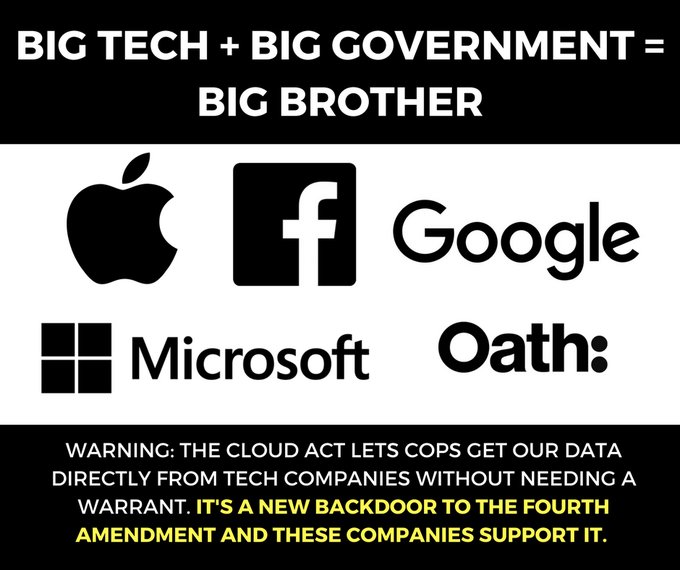'Insidious' and 'Dangerous': Digital Privacy Groups Issue Urgent Warning Over CLOUD Act
Published on
by
Critics say the bill, which could be pushed through Congress this week, would enable U.S. authorities to skirt Fourth Amendment rights to collect Americans' data and use it against them
by

Critics warns that proposed federal legislation "would let police access our data without having to comply with the Fourth Amendment." (Photo: Fight for the Future/Twitter)
Civil libertarians and digital rights advocates are alarmed about an "insidious" and "dangerous" piece of federal legislation that the ACLU warns "threatens activists abroad, individuals here in the U.S., and would empower Attorney General Sessions in new disturbing ways."
The Clarifying Lawful Overseas Use of Data or CLOUD Act (S. 2383 and H.R. 4943), as David Ruiz at Electronic Fronteir Foundation (EFF) explains, would establish a "new backdoor for cross-border data [that] mirrors another backdoor under Section 702 of the FISA Amendments Act, an invasive NSA surveillance authority for foreign intelligence gathering" recently reauthorized by Congress.
Ruiz outlines how the legislation would enable U.S. authorities to bypass Fourth Amendment rights to obtain Americans' data and use it against them:
The CLOUD Act allows the president to enter an executive agreement with a foreign nation known for human rights abuses. Using its CLOUD Act powers, police from that nation inevitably will collect Americans' communications. They can share the content of those communications with the U.S. government under the flawed "significant harm" test. The U.S. government can use that content against these Americans. A judge need not approve the data collection before it is carried out. At no point need probable cause be shown. At no point need a search warrant be obtained.
The EFF and ACLU are among two dozen groups that banded together earlier this month to pen a letter to Congress to express alarm that the bill "fails to protect the rights of Americans and individuals abroad, and would put too much authority in the hands of the executive branch with few mechanisms to prevent abuse."
And, as Fight for the Future notes, the "group of surveillance hawks from both parties" who are advocating for the CLOUD Act are "trying to railroad it through Congress without time for public debate by attaching it to the must-pass omnibus spending bill" that Congress needs to approve by Friday to avoid another government shutdown.
URGENT: Congress is deciding right now, in closed-door meetings, whether to include #CLOUDAct internet spying legislation in the must-pass omnibus spending bill that will be voted on this week. CONTACT YOUR REPS NOW: actionnetwork.org/letters/congre… pic.twitter.com/CzavgGXilc
The #CLOUDAct threatens your privacy—but big tech companies want Congress to rush it into law. Sign the petition to tell your lawmakers to keep the CLOUD Act OUT of the must-pass omnibus bill: actionnetwork.org/letters/congre…
Meanwhile, other opponents such as Freedom of the Press and European Digital Rights (EDRi) are calling on Americans to contact their federal representatives and urge them to vote against the measure:
A proposed bill called the CLOUD Act could allow police to seize Americans' data across borders, without following the privacy laws where the data is stored. This could circumvent the Fourth Amendment—urge your reps to oppose it: eff.org/deeplinks/2018…
Although Sen. Ron Wyden (D-Ore.) is among those opposing the bill in the Senate—including any attempt to tie it to this week's government spending bill—if the vote reauthorizing Section 702 is any indication, several Democrats could join with the Republican majority to push it through.
The CLOUD Act will give Trump - or any president- far too much power to approve surveillance agreements with human rights abusing foreign governments without real oversight by Congress. The House shouldn't attach it to the spending bill.


0 Comments:
Post a Comment
Subscribe to Post Comments [Atom]
<< Home